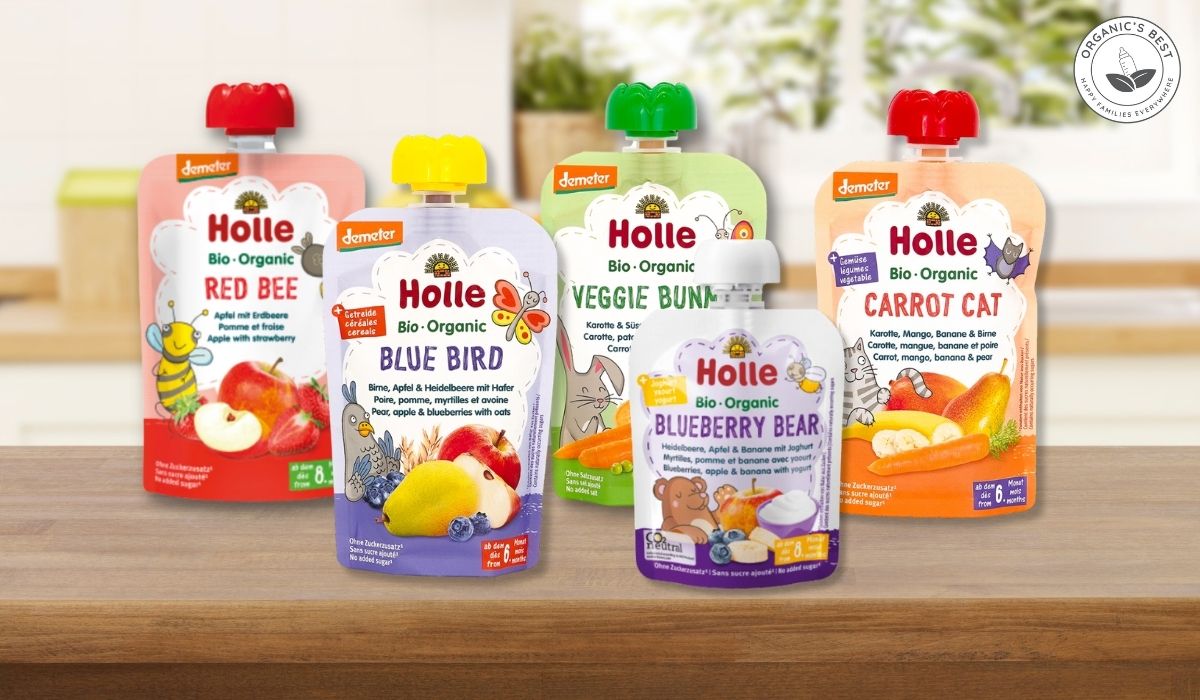Click to Get 2 FREE Boxes/Cans
Only New Customers! Click HERE to Get 2 Extra Boxes/Cans for Free With Your First Order.
BABY FORMULA
Offering new parents top-quality European infant formula from renowned brands like HiPP, Holle, Kendamil, and more. If you’re uncertain about which product to choose, our Formula Finder can help you make the best decision for your baby.
Baby Food
Offering new parents a premium selection of European baby foods, including jars, pouches, cereals, and snacks from esteemed brands like HiPP and Holle.
Best Baby Food Pouches 2026
by Agustina Fernandez January 05, 2026 10 min read

Every parent knows what picky eaters babies can be; it can be challenging for parents to get their little one to eat healthily, and when they're ready to wean, to transition to solids. During that period of transition, infants are introduced to all sorts of new foods and flavors, and training their taste buds can certainly be tricky.
To overcome this hurdle, baby food in a pouch can be a good option. They're versatile, easy-to-store, nutritional solutions that are perfect for those days when time is not your friend. Baby food in pouches offers incredible variety, convenience, quality, and flavor!
In this article, we'll explore some of our top picks for pouches. We'll also go over all of the factors your family should consider when introducing these products into your little one's diet.
Table of contents
- Our Favorite Organic's Best Baby Food Pouch Brands
- What's Unique About European Organic Baby Food Pouches?
- Tips for Finding the Best Baby Food Pouches
- When Can Baby Food Pouches Be Necessary?
- Why Are Baby Food Pouches Recommended?
- Safety of Baby Food Pouches
- Why You Should Use Baby Food Pouches in Moderation
- How Many Pouches Does My Baby Need a Day?
- Baby Food Pouches Benefits
- What to Look for in Baby Food Pouches
Our Favorite Organic's Best Baby Food Pouch Brands
With so many options for baby food pouches, it can be hard to know where to start. To make your life easier, here are some of the healthiest baby food pouches that we offer from Holle!
Holle Baby Food Pouches
Holle is a family-run Swiss company that has been working bio-dynamically since 1934. This means they ensure to protect the soil, environment, and animals during production. Holle baby food is European organic, and most of them are also Demeter certified, which has even more stringent standards than those mandated by the EU.
Holle's resealable squeeze pouch baby food is the perfect small snack for on-the-go! They are versatile, easy to store, and made of pureed foods, including fruits, veggies, cereals, and yogurt. We also appreciate that all the pouches from Holle contain all non-GMO ingredients and no added sugar.
If your little one is starting solids, you may be interested in trying out more foods. Holle makes this easy with their all-flavors kit or best-sellers kit, both of which are filled with a variety of pouch snacks. And for those times when your little one doesn't finish their pouch, Holle pouches can be safely stored in the fridge for 2 days after opening!
Here are some of our favorite Holle baby puree pouches...
#1 Red Bee

Red Bee is suitable for little ones beginning at 8 months. It is made with a base of 100% Demeter-quality fruits, which include apples and strawberries. It is gluten, egg, and lactose-free, making it a great low-allergen snack.
#2 Blue Bird

Blue Bird is suitable for infants beginning at 6 months. It is made with a base of 100% organic and Demeter-quality fruits and cereals, which include unsweetened pear, apple, blueberry, and oats. It is a great egg and lactose-free option.
#3 Carrot Cat

Carrot Cat is suitable beginning at 6 months. It is made with a base of 100% organic and Demeter-quality fruits and veggies, which include unsweetened carrot, mango, banana, and pear. It is gluten, egg, and lactose-free, making it a great low-allergen snack.
#4 Blueberry Bear

Blueberry Bear is suitable beginning at 8 months. It is a filling snack made with fruits, such as blueberries, bananas, and apples, as well as yogurt. It does not contain any added sugar, salt, or artificial additives.
#5 Veggie Bunny

Veggie Bunny is suitable for babies beginning at 6 months. It is made with a base of 100% organic and Demeter-quality veggies such as carrots, sweet potatoes, and peas. It is gluten, egg, and lactose-free, making it a great low-allergen snack.
What's Unique About European Organic Baby Food Pouches?

Organic certification protects little ones from consuming synthetic chemical substances and genetically modified ingredients. The European organic certification has some of the strictest regulations in the world.
Products with the EU organic logo contain at least 95% organic ingredients. The other 5% of ingredients are strictly controlled, and in the case of baby food products, the non-organic ingredients are usually vitamins and minerals that are added to support your baby's growth and development.
Our EU organic-certified baby food pouches are free of added sugars, artificial sweeteners, GMOs, colorants, and hormones. Moreover, the ingredients used in the products are grown at organic farms that support sustainability and animal welfare. This makes them a great option for health-conscious parents looking to reduce their environmental impact.
Learn more: Different Levels Of Organic Certification In Europe?
Tips for Finding the Best Baby Food Pouches
1. Look for a pouch with a low sugar content – Steer clear of any products with added sugar. EU organic products, or those that are vegetable rather than fruit-based, tend to have less sugar.
2. Make sure the ingredients listed on the front of the package are the first ingredients listed on the ingredients list – Sometimes manufacturers label their baby food products as containing healthy ingredients like "broccoli and peas" but when you take a closer look at the ingredients list, the product only contains those ingredients in very low quantities and the real base of the baby food is other food which is less nutritious.
3. Stick to a pouch with vegetables – If your kiddo gets too used to sweet foods with a high sugar content, it can be harder to get them interested in other foods like vegetables or meats. Vegetables are an important part of your child's diet because they're packed full of nutrients and dietary fiber.
When Can Baby Food Pouches Be Necessary?
Although many parents strive to make their own baby food, the reality is that sometimes there just isn't enough time. Pouches can make feeding time a breeze, giving time back to your whole family so you can put your time towards the things that matter most to you.
Learn more: Baby Snacks: Best Healthy and Nutritious Options
Whether you need them for starting the weaning process, to supplement daily meals, as a snack, or as a tool to expand your little one's taste, baby food puree pouches can be a good solution.
They make fruits and veggies more accessible when options for fresh produce aren't abundant or your time is limited. They can also complement home-cooked meals and boost your little one's fruit and vegetable intake.

Why Are Baby Food Pouches Recommended?
Pouches are perfect baby food options when introducing solid food starting from six months onwards. They're specially made with easily digestible, healthy, whole foods. Some also contain important nutrients like iron or healthy fats that help to support growth and development.
It's important not to over-rely on pouches; instead, they should be used in moderation. They are meant to complement homemade meals, textured solids, and breast milk or formula. They are not suitable as a complete source of food.
Here are some tips on how to get the most out of pouches:
1. Spoon-feed the pouch to your little one - Only sucking on pouches means that your baby misses out on learning how to eat using a spoon and strengthening their mouth muscles to chew food properly. As long as you make it a priority to incorporate feeding skills into your kiddo's routine, a pouch won't impede their development.
2. Add some extra texture - Eating is an important part of babies' sensory development. You can help stimulate your baby's senses by adding things like chopped cooked veggies, fruits, or shredded meats to a bowl of baby food from the pouch. This will expose them to new textures and help to develop their oral muscles.
3. Keep an eye on your baby while they eat - Having you by their side is important for their safety. Pouches are a meal best served seated. Sitting down with your baby while they eat helps to prevent choking and builds that ever-important parent-to-child bond.
4. Say hello to finger foods - At the sixth to eighth-month mark, babies' grip starts to improve, so they can hold long, soft foods like sweet potatoes, cooked veggies, and fruit. By eight months, they can pick up small pieces of food all on their own. At this stage, finger foods help to promote healthy and adventurous eating.

Safety of Baby Food Pouches
Current legislation requires manufacturers to prove that their equipment is specifically designed to fill food pouches for babies only. This safeguard exists to help eliminate cross-contamination and keep unwanted impurities from entering the food.
As for materials, it's best to choose a pouch with packaging that is BPA-free to avoid harmful chemicals that are unsafe for babies and toddlers.
Finally, once your baby does get their hands on a pouch, it's important to make this meal a sit-down occasion, as walking around and sucking on a pouch can put your baby at risk of choking. Sitting down to eat is safe, and it helps your child to pay more attention to their food, thereby encouraging them to be mindful, explorative eaters.

Why You Should Use Baby Food Pouches in Moderation
Although it's safe to serve your little one a pouch here and there, it's important to only use them in moderation. Let's look at some of the reasons why...
Pouch Overuse Can Reduce Parent/Child Interaction
When babies are given unlimited access to sucking on a pouch, they miss out on practicing feeding themselves by hand. When parents help their baby to self-feed, it increases their connection to their child.
Further, an overreliance on pouches at a young age can make it harder to transition your tot to other meals as they get older. A good workaround for this is to always squeeze the pouch into a bowl and spoon-feed the puree to your baby.
Pouch Overuse Can Limit Sensory Exploration
It's important for your little one to be able to taste and smell what they're eating. If their only exposure to solids is through a pouch, they lack the important exploration of different textures and the ability to manipulate their food.
We recommend giving your child their pouch squeezed into a bowl with age-appropriate chunks of food for added texture. We also suggest introducing them to finger foods early on, but only once they have developed the higher motor skills needed for it.
Pouch Overuse Can Delay Oral Muscle Development
Eating solids in their natural, non-pureed form is an important way of strengthening all the muscles in the mouth region that your kiddo needs for eating. Sucking on a pouch can lead to tooth decay and stunt oral muscle development. We encourage spoon-feeding pouches to your little one and complementing pouches with sliced solid foods to help support the development of their oral motor skills.
How Many Pouches Does My Baby Need a Day?
Unfortunately, there is no hard and fast rule for how many pouches your little one should have. Some kids are okay to eat several a day and are able to maintain an interest in other types of food. However, kids who rely on pouches too much can become fussy when they can't have a pouch and may even start to reject textured foods.
As a parent, it's important that you remain mindful of your child's eating habits and make the decision to feed them pouches based on their unique needs. If you have any concerns about your child’s diet or eating habits, be sure to reach out to your pediatrician.
Baby Food Pouches Benefits

They are Convenient
For busy moms and dads, a pouch of baby food can be a game-changer. They're easy and fast to prepare, simply squeeze them into a bowl and spoon-fed them to your little one.
They Can be a Healthy Option
Baby food pouches are made with a variety of nutritious fruits, veggies, and whole grains. There is an endless variety of flavors waiting for your baby at just the twist of a cap.
They Help Encourage Independence
When used in moderation, baby food pouches can help your baby to learn important self-feeding skills. As we've mentioned, a great way to encourage this independence is to get your baby to eat their puree with a spoon.
They Can Help Your Baby Learn to Love Veggies
If you introduce vegetable-based baby pouches to your little one during their magic flavor window (between 4 and 7 months), they are more likely to enjoy the taste of vegetables later on because they are more accepting of flavors during this time!
What to Look for in Baby Food Pouches
1. European Organic Ingredients
Your baby deserves the best, that's why you should select baby food with only the highest quality organic ingredients. Organic baby food pouches are filled with fruits, veggies, and grains, and no added sugar or GMOs. That's right, clean, simple, organic ingredients.
2. Safe Packaging
Many aspects of packaging greatly influence the quality of your baby's food and overall health. Look for packaging that is BPA-free, properly sealed, and ideally eco-friendly or recyclable.
3. Produced by a Reputable Company
Many manufacturers take it upon themselves to exceed the EU's requirement to include 95% organic ingredients in their baby food pouches. Take the time to look at the company's mission statement and product list. Do the company's practices align with your values? Lastly, before you buy, read nutritional labels for any unwanted ingredients.
Learn more: How to Prevent the Development of Food Allergies in Babies
Conclusion
Pureed baby food pouches can be both a nutritious addition to babies' diets and a time-saving solution for busy parents. A pouch can offer you and your little one many perks, but it's essential that they're used mindfully so as not to jeopardize your baby's taste preferences or eating skills. Consider following our recommendations to get the most out of your pouches. And remember, healthy eating makes for a happy family!
Disclaimer:
Please be aware that this information is based on general trends evidenced in babies and toddlers, it is in no way medical advice. Your doctor should be your first source of information and advice when making choices related to your child's diet. Always consult your pediatrician prior to making any decisions about your child's diet or if you notice any changes in your child. |
Agustina Fernandez
Dr. Agustina Fernandez earned her medical degree from the prestigious Universidad Nacional de Córdoba, Argentina. With a deep-rooted passion for pediatrics, Dr. Fernandez is currently on the path to specializing in children's healthcare. Recently, she has delved into the vital field of infant nutrition. Her research interests include breastfeeding, infant formula, and baby food in little ones’ formative years. Dr. Fernandez's commitment to this area of study underscores her dedication to ensuring the health and well-being of children from their earliest days.
Leave a comment
Comments will be approved before showing up.
Also in Organic Infant Nutrition and Health Blog

Influenza in Babies: What to Watch for Flu Symptoms in Kids
by Agustina Fernandez January 20, 2026 9 min read
Read More
Infant Botulism: Symptoms, Causes, and Safety Tips for Parents
by Agustina Fernandez January 13, 2026 8 min read
Read More
10 Winter Activities for Kids and Toddlers
by Agustina Fernandez January 06, 2026 8 min read
Read More
Reviewed by Dr. Po-Chang Hsu, MD, MS
-

Dr. Po-Chang Hsu: Medical Reviewer of Organic's Best Blog
Dr. Hsu received his medical degree from Tufts University in Boston, Massachusetts, and holds a Master’s of Science degree from both Harvard University and Tufts University.
